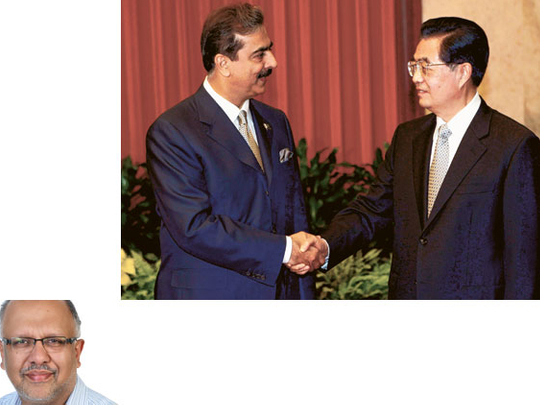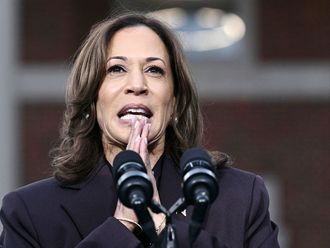
China's decision to use the trip by Pakistan's Prime Minister Yousuf Raza Gilani for announcing a ‘quick delivery' of up to 50 fighter planes to its South Asian partner, must not come as a surprise to anyone. For long, Beijing has built up its ties with Pakistan through repeated support for the country in a range of ways, notably through generous military assistance and economic support.
At a time when Pakistan is being pressed by the US following the May 2 raid by its special forces to kill Osama Bin Laden, China's gesture will be seen by an overwhelming number of Pakistanis as a timely act. Across the country, China continues to retain the image of being a reliable partner and a friend as Pakistanis remember the Islamabad-Beijing friendship with popular phrases like ‘taller than the Himalayas' or ‘deeper than the oceans'.
For the rest of the world, notably the US, there are indeed lessons to be learnt from China's example of support for Pakistan. Beijing's success in forging a close partnership with Pakistan, in part, is attributed to China building its ties with Pakistan on a popular footing. Essentially, China's history with Pakistan has been about building up a solid legacy of trust over time, and keeping the warmth in the friendship, irrespective of the regime in power in Islamabad.
China, to its credit, may have shared some of the concerns which are similar to US concerns over matters like Pakistan's soil being used by religious hardliners. But instead of berating Pakistan's ruling establishment in public and effectively indulging in name calling, China has chosen to deal with its concerns in private.
Consequently, China's friendship with Pakistan is popularly regarded in the country as being built on considerations of brotherhood, in sharp contrast to relations with the US, widely seen to be based on a narrow set of time bound interests.
For the US, countering China's deep-rooted influence in Pakistan must not just be a matter of seeking to outpace Beijing's supply of arms with its own or keeping pace with China's economic assistance. Instead, the US must seek to fill gaps that exist in Pakistan and directly deal with the way the country needs to develop. For instance, almost one third of Pakistan's population of 180 million is known to live below the poverty line. Essentially, this means that one in every three Pakistanis go to bed every night without having had enough food to eat. While US regimes including the Obama administration have keenly counted the dollars they have given to Pakistan, it is not surprising that the US has not earned much goodwill in tandem.
Karakoram highway
The billions of dollars that may have gone in for military assistance or indeed economic support for the budget, are widely seen at the popular level to be without relevance to the needs of ordinary Pakistanis. Besides, unlike China, which has generously invested in infrastructure like Pakistan's Silk Road, known as the Karakoram highway, which opened up the access to the country's northern areas, the US has nothing similar to proudly showcase to ordinary Pakistanis.
Going forward, it is possible that the US may react to the news of China's sale and a planned expeditious delivery of 50 new fighter planes to Pakistan on concessional terms, with great dismay. It is even possible that voices from the US political spectrum including from within the Obama administration may call for curbs on Pakistan in view of its dealings with China. Tragically though, such harsh reaction will fail to curb what is indeed a close relationship between Pakistan and China. On the contrary, any suggestion of even half the punitive steps against Pakistan may indeed only give added incentive to both Pakistan and China to draw themselves ever closer.
What will be a far more productive exercise by the western world would indeed be to closely assess exactly what drives the proximity between Pakistan and China, and the ways in which that proximity can be emulated by the global community to its own advantage.
Almost six decades after China and Pakistan became friends, across Pakistan, the People's Republic of China stands recognised as the country's only time-tested ally which will never let Islamabad down. In sharp contrast, the image of the US as a country whose relations with Pakistan have just been based on one deal after another, says much about the popular Pakistani view of Washington's reliability or lack of it, as a future strategic partner.
Farhan Bokhari is a Pakistan-based commentator who writes on political and economic matters.









